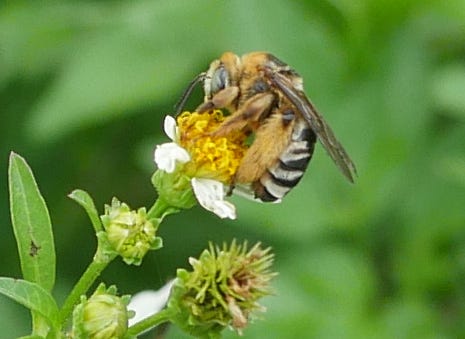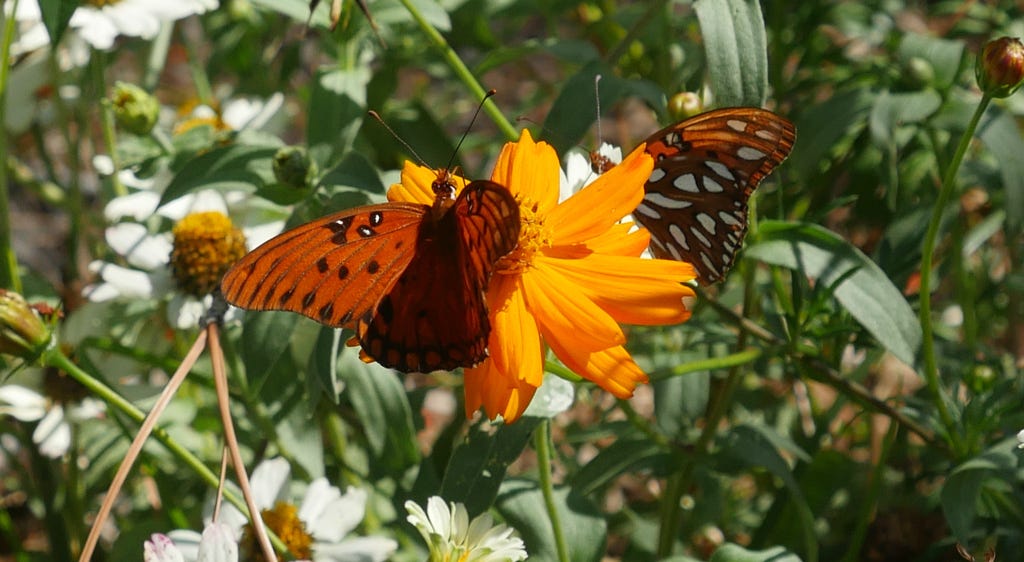As we move into the summer months with more humidity and rain, growth is exploding! And with it, weeds.
Our farm ends up resembling an impenetrable jungle in some places over summer if we leave it be. We’re ok with that though, because it’s all wonderful, beautiful fertility for the soil.

Nature may be the closest thing to a perpetual motion machine that exists on earth. This works through a highly efficient integration of sun, weather and plants. The sun creates energy through the magic of photosynthesis, and water cycles continuously throughout the planet. Sunlight and water allow nature to build the last ingredient that is necessary to support plant life - soil that provides the nutrition plants need to grow, and thus feeding everything else.
By working with this magical explosion of growth instead of fighting it, which can be a temptation, we reduce our work while increasing fertility and the system’s capacity to produce. So we let the jungle grow in summer, and then direct some of that beautiful biomass into areas where we want to concentrate fertility, mainly our garden beds.
Cover crops control weeds
We have a simple fix for our garden beds over summer too. We plant easy-to-grow summer beans there that perform multiple functions.
• They feed the soil with nitrogen they’re able to pull from the air (unlike most plants, the bean family has this ability),
• they suppress weeds that can rob the soil of nutrients,
• they hold moisture in the soil thus encouraging beneficial soil life,
• and they provide nutrients and cover for pollinators and other beneficial creatures.
We can walk away from the garden in summer by planting a thick layer of summer beans like cowpeas. We chop the beans down when we return and use as mulch, thus creating beds ready to plant winter crops in.
Because we can grow year round in Florida and many of us are growing in sand, the soil can be quickly depleted of nutrients. The hot summer sun can also bake off quite a lot of nitrogen, a key nutrient for plants. It’s essential that we cover the soil with something - dense cover crops that add nitrogen to the soil rather than depleting it make a lot of sense.
Supporting nature
We let some flowering “weeds” persist in our gardens in summer because they provide valuable food for the pollinators that are so helpful to us in controlling pests. Bidens alba (Spanish Needle), while the bane of many gardeners, is an important pollinating native “weed” in Florida.

In permaculture, a “weed” is a plant that you don’t want in the place it’s growing. Thus, we don’t look at Bidens alba as an annoyance, but a gift instead. It not only provides pollinators with food during seasons with few other wildflowers, but it also provides plenty of fertility.
One strategy we have is to allow it to grow in select patches in the garden and cut it down right before it begins to go to seed. We stagger these cuttings so as to always have some blooming.
This helps control it so it doesn’t spread too aggressively, while helping it to flower longer and more consistently. We use the cuttings as compost or mulch. It’s easier and less time consuming than pulling it out and it builds soil instead of disturbing it.
We also let Cosmos self seed in the garden which it is happy to do in the hot months in Florida. It brings cheery beauty and tends to be perpetually covered with butterflies. These magical guys flitting around while we’re working in the garden is a nice extra perk! (delete last sentence and replace with this one).
Care free food in summer
Seminole pumpkin is a low care vegetable that often self seeds and produces abundantly through summer and into fall. It also acts as a “living mulch” to keep grasses in check and protects the soil from the baking sun.
This volunteer seminole pumpkin popped up in one of our unused compost bins. No need to feed or water it or prep the soil. We left space in front of our compost pile specifically to accommodate compost volunteers like this one to sprawl.
For food, we focus on tropical perennial greens like chaya (tree spinach), moringa and longevity spinach, and tropical roots like sweet potato. These grow abundantly and naturally without any help from us. All we have to do is go out and harvest the food.
We approach Florida summers like northern gardeners might use winter - to renew, contemplate, plan, socialize, and give our annual gardens a rest.
By working with the seasons nature offers us, we reduce our workload. Weeding the garden during aggressive growth periods is hard work! Why not let nature suppress weeds, and use whatever weeds do grow to feed beneficial insects and then feed the soil for the next season by chopping them down and using them as compost or mulch?
We continue to build soil over summer in other ways as well. We’ll share more of that in future newsletters.
We discuss these techniques and many more in our online and in person Permaculture Design Courses.
Want to become a Permaculture success? Checkout our online and in person permaculture courses under the direction of Koreen Brennan!
Grow Permaculture Curriculum and Courses:
Are you ready to take your next step in Permaculture? If so, we’ve got you covered from novice to all-star. Our our courses are under the direct supervision of Koreen Brennan, educator, diplomate, and PINA board member.
Online Permaculture Design Course
The internationally recognized Grow Permaculture Online Permaculture Design Course comes with hands-on practical and mentoring. Now more than ever, people have attention on creating more choices and resilience in their lives. We want healthy food, a clean environment, happiness and security for us, our children, and future generations. This course offers practical steps to achieving these things in your own life, regardless of your circumstances. You can get started right away! Sign up now!
In-Person Permaculture Design Course
This is Grow Permaculture’s internationally recognized In-Person Permaculture Design Course. This course will be held in St Petersburg, FL, and at our farm in Brooksville, giving people an opportunity to see permaculture in action on both the farm while also studying in an urban environment. Space is limited sign up today!
Check out our full lineup of Grow Permaculture Courses!









This was lovely to read. I moved to a studio apartment so I’m beginning a potted garden 🪴